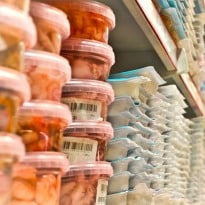Nanoparticles are ultra fine materials that are vary between 1 to 100 nanometers in size. Various food and drink producers use nanoparticles in packaging. They are also regularly being used in personal care products and even as food additives.A new study reveals how these nanoparticles pose a serious health risk to humans as well as cause environmental degradation. It shows that these tiny compounds can interfere with human digestive cells and also release damaging substances that can harm the environment.In packaging, nanoparticles provide strength, control how much air gets in and out, and keep unwanted microbes at bay. As additives to food and drinks, they can prevent caking, deliver nutrients and prevent bacterial growth. (More: Is plastic food packaging dangerous?)
US-based lead researcher Robert Reed explains, "Consumers might absorb some of these materials through their skin, and inhale and ingest them. What does not get digested is passed in urine and faeces to the sewage system." Reed further noted that, "In humans, if such an effect occurs as the drinks pass through the gastrointestinal tract, these materials could lead to poor digestion or diarrhea."For the study, researchers tested the effects of eight commercial drinks containing nano-size metal or metal-like particles on human intestinal cells. It was found that the consumption of these drinks changed the normal organization and decreased the number of microvillus; finger-like projections on the cells that help digest food.Researchers further analyzed sewage waste containing these particles and found out that most of the nanomaterials are making their way back into surface water, potentially causing damage to aquatic life and the environment.With inputs from IANS
US-based lead researcher Robert Reed explains, "Consumers might absorb some of these materials through their skin, and inhale and ingest them. What does not get digested is passed in urine and faeces to the sewage system." Reed further noted that, "In humans, if such an effect occurs as the drinks pass through the gastrointestinal tract, these materials could lead to poor digestion or diarrhea."For the study, researchers tested the effects of eight commercial drinks containing nano-size metal or metal-like particles on human intestinal cells. It was found that the consumption of these drinks changed the normal organization and decreased the number of microvillus; finger-like projections on the cells that help digest food.Researchers further analyzed sewage waste containing these particles and found out that most of the nanomaterials are making their way back into surface water, potentially causing damage to aquatic life and the environment.With inputs from IANS
Advertisement








